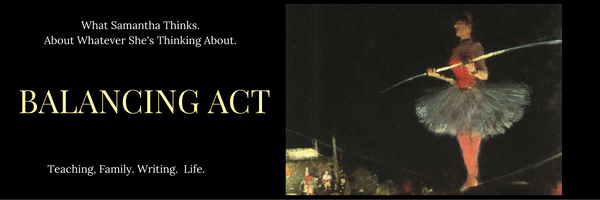The smallest place I ever lived was Kenny Lake, Alaska, population 400. I taught in a school of 100 children, grades K-12. My Spanish class had four students in it.
I loved it.
I knew nearly everyone, when I'd been there only a year. The people I didn't know by name still knew me, because I was a teacher at the school. The life of the community was around the school and the children. Everyone came to the hockey games.
We dealt with each other as individuals. None of this crap of making a blanket rule about something because there's a problem with one person. You would just talk to the one person, directly. I miss that.
The biggest place I ever lived was Madrid, Spain. That was just for a summer tour of study. For the summer, it was fine. Though I was intimidated at times, especially since I was living in a country that I only kind of spoke the language of, I really enjoyed walking everywhere, exploring gorgeous public parks, taking trains, living a public life. I enjoyed the feeling of life and vitality, like there was something exciting around any given corner.
But, when I got back to small town Kentucky afterwards, I was glad to be home. Madrid was exciting, and exhausting.
Cities are nice to visit. I kind of like living within reach of one, where I can drive there when I want to take advantage of what they have. It's nice to go hear a variety of types music, go to good art museums, see professional theatrical productions, or eat really specific ethnic foods. But I am not a city girl.
I don't like traffic. I get grumpy if I have to wait more than a few cars worth of waiting. This is bad enough that I generally stay off the road between 5:30 and 6:00 in my current hometown (population 6200), because you might have up to ten minutes in traffic getting through town.
I also don't like crowds. They are loud, and there are always at least a few truly obnoxious people in them. Crowds make it hard to move because there are always people in your way. Crowds make it hard to hear the person I'm walking with. The energy of a crowd worms its way into your psyche and influences your mood. This makes me feel stubborn. I want to feel what I feel, not get sucked into a group feeling.
Related to the crowds thing, I don't like being forced into physical proximity with people I don't know. Whether this is jostled around in a crowd, or just sharing a bus seat with a stranger, I don't like it. My personal bubble is large. If I don't know you, stay out of it!
While I do like people, individual people that I know by name and face and build a relationship with, I don't like PEOPLE as a big anonymous group of individuals I may not ever encounter again in my life. It makes me happy to walk into a small business and be recognized by the sales clerk, to know to ask about her new grandchild or puppy or home improvement project, because we talked about that last time I was in. It makes me feel connected.
I'm bad at meeting people. City life strikes me as transient, full of new people all the time. It stresses me out. I told my husband that one of the best things about starting to date him a decade or so ago was that I didn't have to meet him. We had already met a decade or so before that and were friends. Maybe familiarity breeds contempt, but I'm more worried about stranger danger and making first impressions. (shudder)
They're putting a hospital in, here in my small town. They knocked down a bunch of trees for it, and built three big brick buildings that would look at home in a much larger, more modern place. I hate it. I get how it's good for the community, but it's bringing changes I won't like. It's already added a traffic light to my life, with a turn arrow and everything. What's next? A Starbucks?
Yeah, it might be time to start thinking about my next home. I can breathe in a small town. I can be myself in a small town. And that's good enough for me.

I firmly believe that humans were not designed to live in large groups. It makes us crazy. There are no legends about non-industrial people shooting their families and themselves. Our numbers and our proximity to each other accounts for a number of modern ills.
ReplyDelete